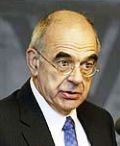Darfur refugees release last Sudanese hostages – UN
Oct 26, 2005 (KHARTOUM) — Darfur refugees released Sudanese hostages detained in a displaced people’s camp, the United Nations said Wednesday.
 The release of the five hostages came as the U.N.’s top envoy for Sudan, Jan Pronk, said the worsening situation in this country’s crisis-wracked west is harming the flow of humanitarian aid. The five were released late Tuesday or early Wednesday from the Kalma Camp in the South Darfur city of Nyala, U.N. spokesman George Somerwill said.
The release of the five hostages came as the U.N.’s top envoy for Sudan, Jan Pronk, said the worsening situation in this country’s crisis-wracked west is harming the flow of humanitarian aid. The five were released late Tuesday or early Wednesday from the Kalma Camp in the South Darfur city of Nyala, U.N. spokesman George Somerwill said.
In an unrelated development, militants shot and killed the head of the Islamic Bank of Faisal in el-Fasher, the capital of northern Darfur, the state-run SUNA news agency reported. It said that Ibrahim Ahmed Basher was killed in his car late Tuesday. The governor of northern Darfur, Osman Youssef Kebir, accused both the Darfur rebels’ Justice and Equality Movement and the Sudanese Liberation Army of being behind the killing.
The five released hostages were among 30 Sudanese aid workers and 18 Health Ministry employees abducted by angry refugees protesting the Sudanese government’s recent detention of a popular tribal sheik Mohammed Jebril, South Darfur police said in a statement.
The hostages were held in a medical clinic run by the Spanish Red Cross and the Sudanese Red Crescent since Sunday. The bulk of the hostages were released on Monday.
Pronk told reporters that Jebril’s arrest was an example of the government’s mishandling of the security situation in Kalma and said there was a “power vacuum” in the camp.
He added that Sudanese authorities arrested Jebril because he criticized the government during a June visit by U.N. Secretary-general Kofi Annan. Pronk said Jebril has been transferred from military intelligence custody to a local police station, which eased tensions in the camp.
The Kalma Camp is home to about 90,000 people forced from their homes during the Darfur conflict, which began in February 2003 when two African rebel groups took up arms against the Sudanese government amid accusations of repression and unfair distribution of wealth.
The government has been accused of supporting Arab nomads known as the Janjaweed, who have been blamed for a campaign of killings, rape and arson. The Sudanese government denies backing the Janjaweed.
The United Nations estimates that 180,000 people have died, mainly through famine and disease. Several million more have either fled into neighboring Chad or been displaced inside Sudan.
Separately, Ibrahim Ahmed Basher, the head of the Islamic Bank of Faisal in el-Fasher, capital of northern Darfur, was found dead after militants opened fire at his car on Tuesday night on his way home, the state-run news agency SUNA reported Wednesday.
The news agency said that the governor of Northern Darfur Osman Youssef Kebir filed a lawsuit accusing both Darfur rebels’ Justice and Equality Movement and Sudan Liberation Army of being behind the killing.
Pronk expressed concern over the worsening security situation, saying it was having a negative impact on the humanitarian situation.
“It is not possible anymore to send humanitarian aid by road and the only way available now is by dropping it from airplanes,” Pronk said.
Pronk said the humanitarian aid had decreased the rate of malnutrition and death among Darfur’s children.
According to Pronk, rates of malnutrition decreased from 12.9 percent of all children in 2004 to 1.4 percent in 2005. Death rates among those younger than 5 dropped from 1 percent for every 10,000 children in 2004 to .7 percent this year.
(AP/ST)
